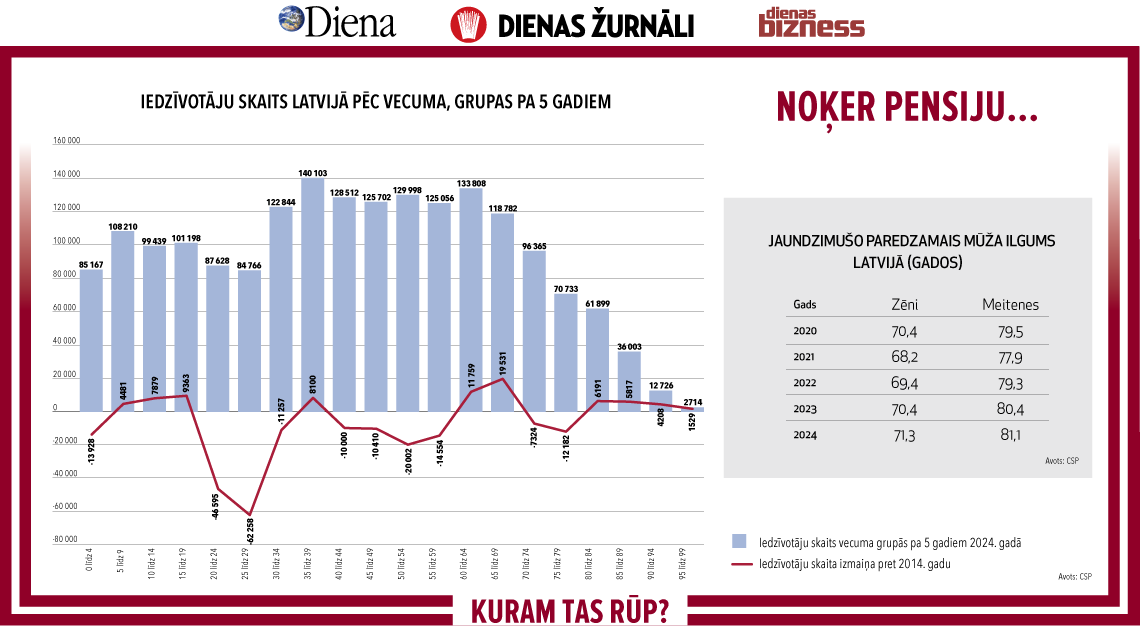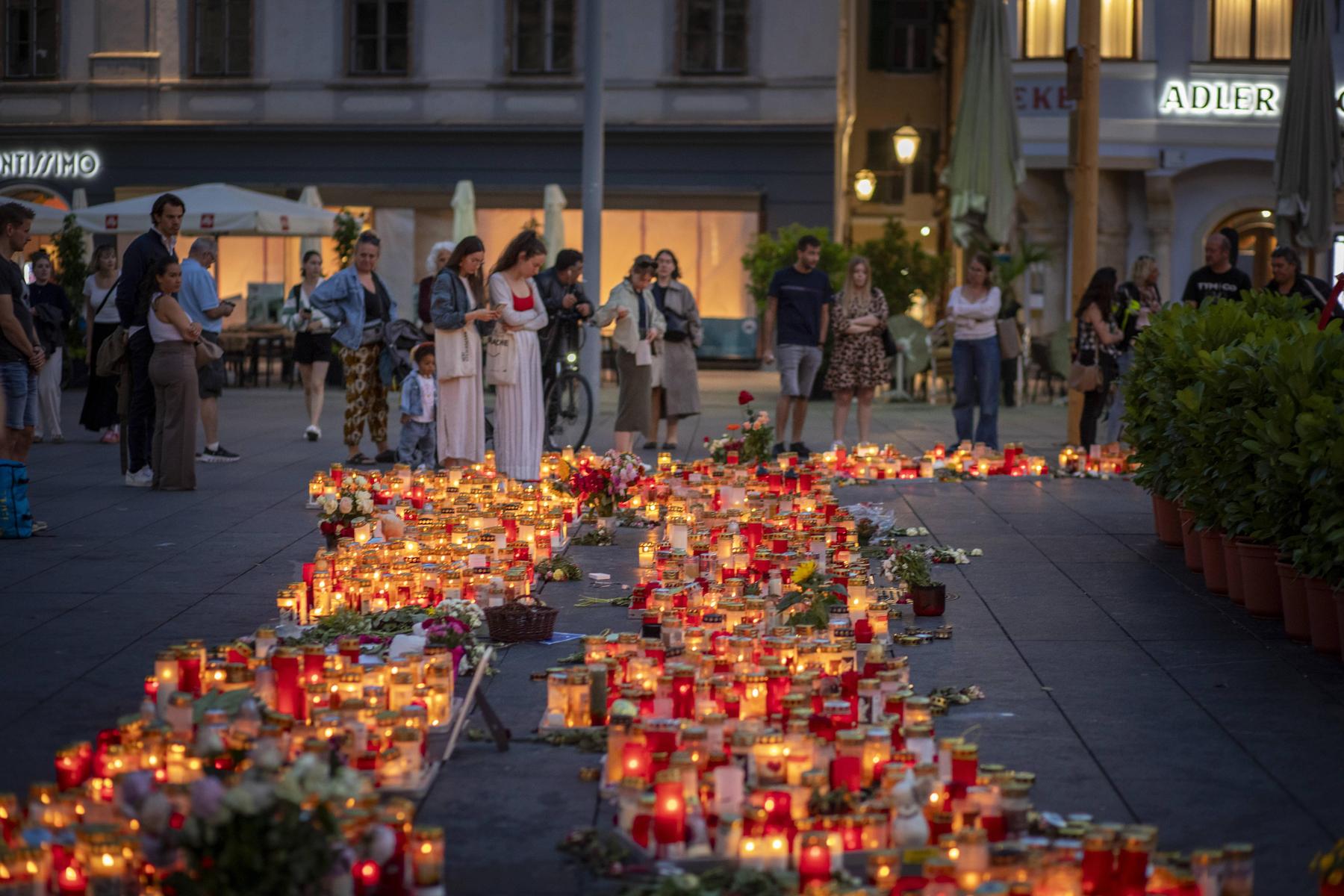Retirement from 70 years? / Day

« It is inevitable that you will have to raise the retirement age from 70 years of age very soon. For years, no one is addressing and unwilling to deal with it, because it is not easy and fast, but in politics, thinking is only four years, » The united list Andris Kulbergs.
In essence, the latest Latvian demographic data from the Central Statistical Bureau (CSB) is nothing new and amazing. What the deputy is currently talking about and announced by Janis Herman, the financial and tax expert of the Latvian Employers’ Confederation, is the fact that much more people are retired at the moment than new ones are coming to the labor market.
J. Hermanis reveals a pyramid to the age of Latvia: « The retirement age reaches more than 26 thousand, but about 16 thousand replaces them in the labor market. After 25 years, about 28 thousand will want to retire, but about 12 thousand will come to place them. » It should be noted here that Mr Herman, when using the word « approximately », is trying to avoid migration on the forecast. For example, it is possible that tens of thousands of people are returning to living in Latvia. Emotionally, such a call can be for humans. Changes in other age groups are also possible if one of the country’s policies changes. Mr Herman only talks about the obvious CSB demographic « fir » and what it promises tomorrow and after a while. On this very naked base, A. Kulbergs offers a possible solution to increase the retirement age to 70 years.
If increasing tomorrow
If, for example, we were to increase the retirement age tomorrow and take the basis for last year’s population by age, we would get a very interesting picture. Given that an increase in the retirement age to 65 has just been completed, it was interesting to look at changes in the population at different ages since 2014, which also allows you to see changes in the population in ten years and, of course, the potential benefits or how many people could not pay their pensions right away.
Thus, from the year to 2024, the population aged 60 to 65 has increased by 14,542. This is a benefit that is currently enjoyed by the Latvian state after increasing the retirement age in advance. By the way, the deadline is closing right now.
In the age group of 66 to 70 years, the population has increased by 17,180 people. Understandably, if we were even increasing the retirement age to 70 years, another 17 thousand would not have to pay pensions. It should be noted that in the remaining age group of 71 years to 99, there is a decline in population over 2193 people over the age of 10. From the point of view of money, it would be profitable to increase the retirement age tomorrow. There would be no worry about the social budget.
Why pay SSIO at all?
This year, the previous retirement age has been completed and people retire from 65, so the data of 2024 are the most intense and the only true to discuss the current retirement age. So far, people who started their work in the USSR felt an increase in the retirement age. Namely, another country had made the promise of retirement and, at least legally, these people could not be accused of directly. Those who could, those who began to work after 1990, could only begin protesting around 2030. When it comes to a new increase, which is unlikely to begin, not tomorrow, but in 2030, if it is decided, it will affect the people whom the Latvian state has promised that they pay the state social security contributions (SSIO) and receive a specific retirement age. Each change is completely undermined by any confidence in the country, and logically it has consequences. People ask the question – why pay SSIO at all?
In addition, this issue of retirement ages from 70 would be quite logical for many people. The average life expectancy is no longer trying to release in any European country or in the European Union as a whole. There is the term « average expected life expectancy » for people slightly greater than the real average life expectancy. Namely, from the current data, according to a certain methodology, the potential life expectancy of the future is calculated if everything goes as usual so far. We also have no bright with this size. So, at the end of 2023, the average life expectancy of newborn boys was 70.4 years, which means that most men would retire for less than a year at 70. For women, life expectancy is 80.4 years old, and most likely they would still agree with an increase in the hope of living the average promise. In 2024, the expected life expectancy of newborns is increasing for a year. It is understandable that the true life expectancy can be seen at the moment by looking at the picture.
Concerns about the social budget
There is understandable concern about the social budget in the future, because in reality pensions are paid by the workers, and all those stories about accumulation are a bit false. The pension system in Latvia actually works differently. Workable people pay pensions to existing pensioners, and what they pay for serving as a calculation of how much they will receive in the future, as long as the next generation is. Therefore, it is no wonder that the only rescue deputies see the retirement age. However, in practice, it can be seen that the main gravity of the age group is currently 65 to 70 years, which will continue for some time. Leaving this group without pensions, the public will not see the need for pensions at all. On the other hand, it may turn out that the current volume indexation is no longer possible and pensions are so small that they cannot be dispensed with. The set of facts suggests the possibility of solving the problem differently.
What are the other options?
From age, the pyramid shows that the largest loss of the population is in the age group of 19 to 32. In ten years, 127,000 people have been lost in this age group, who could have children in Latvia in the next ten years. Namely, lost young parents between 2025 and 2034 would give Latvia at least 60 thousand children, who are currently understood as a decline in birth.
In short, the solution to the problem after 20 years would be that today we reserve youth at home, showing them a place in life here in Latvia, trying to keep our young people with ourselves, because the workforce is missing everywhere. It should be noted that this group is not supported by new families. They are young parents who have not yet met and do not think about them in Latvia. Who cares about it? Who cares about 60 thousand children in ten years?
Another problem is retirement pensions, which creates an additional burden on the pension system. Namely, there are a number of professions that have retired retirement pensions, and it is not clear whether today the old system is still relevant in all areas.
Finally, it is once again the opportunity to think about re -migration, as those 127,000 young people who have left the last ten years are still recoverable. Just show the opportunity here in Latvia, raising the five -year -olds, six -year -olds, freshmen born somewhere in Germany, Norway, Spain or Italy. Loud and convincingly say that we need people, that they are waiting for them here and there will be a place. Not a one -time entry benefit at home, but a real policy for all residents of Latvia who would say that residents are needed here.
The closing thing is pensioners who either live abroad or return to living in Latvia, as well as the status of foreign pensioners in Latvia. There are enough all these special cases and it is not really clear whether this system is arranged.
In a nutshell, the Latvian state still has a number of opportunities before announcing the great run of death or the next chase of retirement age.








